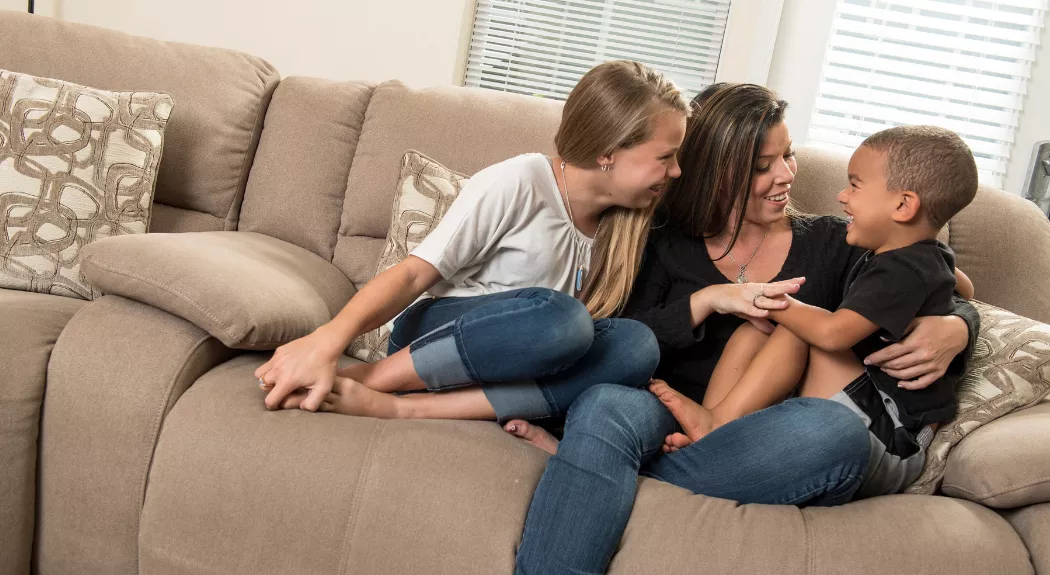Effective January 20, 2026, masks are encouraged for all staff, patients and visitors at all Luminis Health locations and will remain encouraged through the end of the influenza season. Thank you for your patience as we continue to care for our community.

Brandy Brooks plays with her two children, Skylar and RJ.
Last summer, Brandy Brooks, 39, was on a family vacation with her boyfriend and two children. Grabbing some ice cream to enjoy the cold treat in the hot weather, Brandy was having a great time. It wasn’t until she started laughing that she noticed something was off and had to urgently use the restroom. On their way back to the resort where they were staying, again she noticed something was wrong. But this time, she wasn’t able to hold it. Walking into the resort, she did it again.
“Every time I would laugh or sneeze, I would pee myself,” Brandy recalls. “It was embarrassing.”
Everything started in 2005, when Brandy had her first child. Like many women, Brandy experienced urine leakage during her pregnancy. But she continued to experience similar symptoms after giving birth to her daughter.
“It was still a problem, but not huge,” Brandy says. “I didn’t have to wear protective garments so I didn’t pay much attention.”
In 2013, Brandy had her second child. After having her son, she says things got worse. “It got progressively bad, to the point I had to wear adult protection all the time,” Brandy says. “Sometimes, I would wear two types at the same time. I was also having bad menstrual cycles.”
Brandy remembers talking to a colleague about her concerns. Her colleague mentioned to schedule an appointment with the doctor that had helped her.
Brandy was experiencing the symptoms of a pelvic floor disorder (PFD), a common problem many women experience, especially after giving birth. Almost one-quarter of women have pelvic floor disorders, according to a study funded by the National Institutes of Health. The study revealed that pelvic floor disorders affect about 10 percent of women ages 20 to 39; 27 percent of women ages 40 to 59; 37 percent of women ages 60 to 79; and nearly half of women age 80 or older.
“I was having more leakage over time and I decided to have a procedure to correct some of my symptoms,” says Brandy.
Understanding pelvic floor health
“The problem for women not knowing about pelvic health disorders is that they walk around with symptoms that they think are normal,” says Kay Hoskey, MD, urogynecologist with AAMC Women’s Center for Pelvic Health. “Most of the time, if women leak a little bit or feel different during intercourse, they write it off as normal. These are not always normal symptoms and if this is something women don’t want to deal with, there’s help.”
When Brandy came to AAMC Women’s Center for Pelvic Health, her complaint was having everyday issues with urinary incontinence.
“We explored her history and did some diagnostic studies,” Dr. Hoskey says. Brandy had experienced symptoms for 11 years, while the average time that a woman takes to present with pelvic floor disorders is about seven years. “I would encourage women to not ignore the symptoms for that long,” Dr. Hoskey says. “You don’t have to deny, dismiss or disguise symptoms like these, there are options that can help women deal with PFDs.”
At AAMC Women’s Center for Pelvic Health, the practice primarily focuses on bowel issues, urinary issues and pelvic organ prolapse, among other areas. Taking a holistic approach, the practice offers a variety of treatments, including dietary recommendations, exercise, biofeedback, massage and surgery when necessary. Brandy required robotic surgery, an option that allowed her to heal faster with less pain and scarring.
“She didn’t want to use the restroom as often and she didn’t want to have heavy periods,” Dr. Hoskey says. “She wanted to get back to her normal activities, like being able to play with her kids without having any concerns.”
Regaining a carefree life
Two weeks after surgery, Brandy went out with her boyfriend to the store. Joking around, Brandy started laughing. “I laughed and laughed and realized I wasn’t rushing to the restroom,” Brandy says. “I told my boyfriend and started to cry because I was able to laugh without any worries.”
Brandy also noticed other big changes, such as not experiencing heavy, painful periods. For her, this was a new opportunity to regain a carefree life. After years of experiencing incontinence and worrying about leaving her house and having to take protection with her, she no longer has to think about where the nearest restroom is or if she will have an embarrassing moment in public. A full-time mom and employee gearing up to get her nursing degree, Brandy encourages other women to not be embarrassed and pay attention to their health.
“I feel like a young woman whose bladder is working the way it is supposed to,” Brandy says. “Don’t be afraid to seek the treatment for it or worry about what others will say, you really need to worry about yourself and take care of yourself first.”
If you’re experiencing discomfort or pain due to a pelvic condition, visit AAMC Women’s Center for Pelvic Health website and schedule a consultation.



